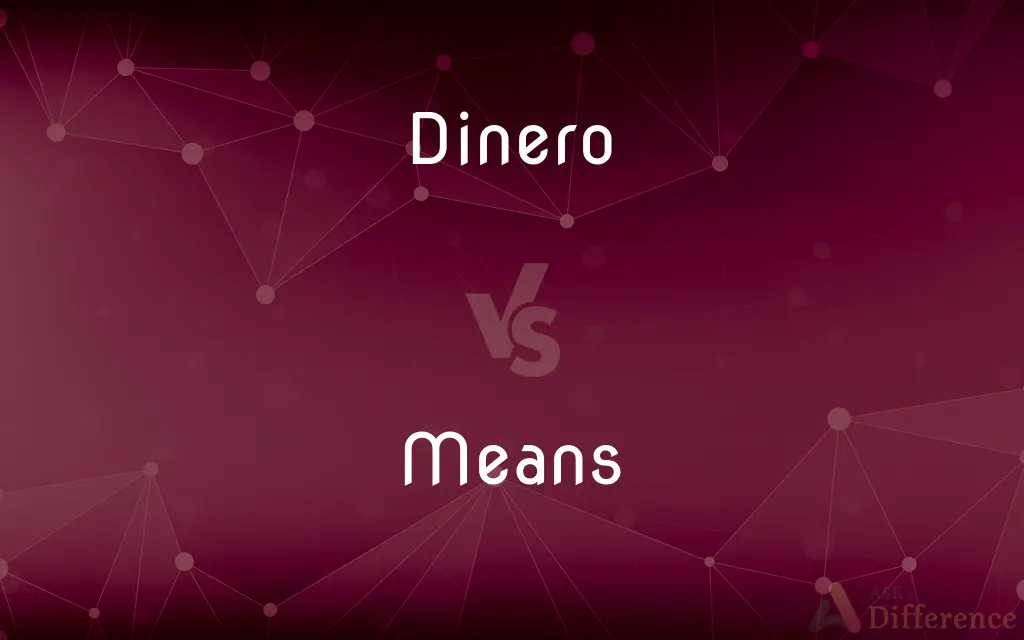Dinero vs. Means — What's the Difference?
By Tayyaba Rehman — Published on October 24, 2023
Dinero refers to money, particularly in Spanish. Means refers to methods or resources available to achieve something.

Difference Between Dinero and Means
Table of Contents
ADVERTISEMENT
Key Differences
Dinero is a term that originates from the Spanish language, signifying "money." In many Spanish-speaking cultures, dinero is used colloquially to refer to cash or currency. On the other hand, Means in English can refer to a method, technique, or way to achieve something. It isn't specifically tied to monetary connotations but can encompass any resource used to attain an end.
Dinero has a direct association with monetary aspects and is often used in informal conversations or pop culture to signify wealth or cash. Means, however, is broader in its application. While it can represent financial resources, it can also allude to other types of resources such as time, skills, or tools.
In linguistic terms, Dinero is a noun that is quite specific in its meaning. It doesn't have much room for varied interpretations outside of its association with money. Means can be both a noun and a verb in English. As a noun, it represents resources, and as a verb, it's about intending to convey or indicate.
It's also interesting to note the cultural significance. Dinero, because of its Spanish origin, holds a particular cultural weight in regions where Spanish is predominantly spoken. Means, being an English word, doesn't have the same cultural specificity but has a broader application in various contexts across different cultures.
In conclusion, while Dinero and Means might seem similar due to their potential association with resources, they are distinct in their origin, application, and linguistic properties. Dinero is strictly about money, especially in a Spanish context, while Means has a more expansive definition in English.
ADVERTISEMENT
Comparison Chart
Language of Origin
Spanish
English
Primary Meaning
Money
Method or resource
Linguistic Function
Noun
Both noun and verb
Cultural Association
Predominantly Spanish-speaking regions
Broader cultural context in English-speaking regions
Usage Context
Informal, pop culture
Varied, from formal to informal
Compare with Definitions
Dinero
Spanish term for money.
He earned a lot of dinero from his new job.
Means
Financial capability or wealth.
They live beyond their means.
Dinero
A colloquial reference to wealth.
He's got enough dinero to buy that mansion.
Means
Methods or ways to achieve something.
She found the means to complete her project on time.
Dinero
Currency or cash.
She paid in dinero rather than using a credit card.
Means
Resources or assets available.
He lacks the means to purchase a new car.
Dinero
Slang for monetary assets.
Without the necessary dinero, we can't invest in that project.
Means
Instrumentalities used to achieve an end.
The internet is a means to access vast information.
Dinero
A casual term indicating funds.
I'm low on dinero this month.
Means
An action or system by which a result is achieved; a method
Resolving disputes by peaceful means
Technology seen as a means to bring about emancipation
Dinero
Informal terms for money
Means
Financial resources; income
A woman of modest but independent means
Means
To be used to convey; denote
"'The question is,' said Alice, 'whether you can make words mean so many different things'" (Lewis Carroll).
Means
To act as a symbol of; signify or represent
In this poem, the budding flower means youth.
Means
To intend to convey or indicate
"No one means all he says, and yet very few say all they mean, for words are slippery and thought is viscous" (Henry Adams).
Means
To have as a purpose or an intention; intend
I meant to go running this morning, but I overslept.
Means
To design, intend, or destine for a certain purpose or end
A building that was meant for storage.
A student who was meant to be a scientist.
Means
To have as a consequence; bring about
Friction means heat.
Means
To have the importance or value of
The opinions of the critics meant nothing to him. She meant so much to me.
Means
To have intentions of a specified kind; be disposed
They mean well but lack tact.
Means
Something having a position, quality, or condition midway between extremes; a medium.
Means
A number that typifies a set of numbers, such as a geometric mean or an arithmetic mean.
Means
The average value of a set of numbers.
Means
(Logic) The middle term in a syllogism.
Means
Means (used with a sing. or pl. verb) A method, a course of action, or an instrument by which an act can be accomplished or an end achieved.
Means
Money, property, or other wealth
You ought to live within your means.
Means
Great wealth
A woman of means.
Means
Occupying a middle or intermediate position between two extremes.
Means
Intermediate in size, extent, quality, time, or degree; medium.
Means
Plural of mean
Means
An instrument or condition for attaining a purpose.
She treated him as a means to an end.
A car is a means of transport.
Means
(uncountable) Resources; riches.
A person of means;
Independent means
He was living beyond his means.
Means
How a result is obtained or an end is achieved;
A means of control
An example is the best agency of instruction
The true way to success
Means
Instrumentality used to achieve an end
Means
Considerable capital (wealth or income);
He is a man of means
Means
Indication or conveyance of a certain idea.
What do you mean by that?
Common Curiosities
Is Dinero used in formal contexts?
Typically, Dinero is used in informal or colloquial contexts, especially in English discussions.
Can "Means" be both a noun and a verb?
Yes, "means" can function as both a noun and a verb in English.
What language does "Dinero" originate from?
Dinero originates from the Spanish language.
Which word is more specific to monetary references?
Dinero is more specific to monetary references than Means.
Can "Means" be used to refer to money?
Yes, "means" can refer to financial resources or assets.
How is Dinero commonly used in pop culture?
Dinero is often used in songs, movies, or literature to refer to wealth, money, or affluence.
Is Dinero used outside of Spanish-speaking contexts?
While its origin is Spanish, Dinero can be recognized in many English contexts, especially in colloquial or pop culture references.
Can Dinero refer to currencies other than the Spanish currency?
Yes, in colloquial use, Dinero can refer to any form of money, not just Spanish currency.
Can "Means" also refer to average resources of a group or community?
Yes, "means" can be used in contexts like "living within one's means" or "average means" referring to the average resources of a group.
What's the primary meaning of Dinero?
The primary meaning of Dinero is money or cash.
Can "Means" indicate intention in a sentence?
Yes, as a verb, "means" can indicate intention or conveyance of an idea.
Can "Means" refer to methods other than monetary ones?
Yes, "means" can refer to any method or resource, not just monetary.
Are there any synonyms for Dinero in English?
Yes, synonyms for Dinero in English include cash, money, bucks, and dough.
Does "Means" always refer to tangible resources?
No, "means" can refer to intangible resources like time, knowledge, or skills.
Is "Means" used more in formal or informal English?
"Means" is versatile and can be used in both formal and informal contexts.
Share Your Discovery

Previous Comparison
Lily vs. Lotus
Next Comparison
Oxybenzone vs. AvobenzoneAuthor Spotlight
Written by
Tayyaba RehmanTayyaba Rehman is a distinguished writer, currently serving as a primary contributor to askdifference.com. As a researcher in semantics and etymology, Tayyaba's passion for the complexity of languages and their distinctions has found a perfect home on the platform. Tayyaba delves into the intricacies of language, distinguishing between commonly confused words and phrases, thereby providing clarity for readers worldwide.













































